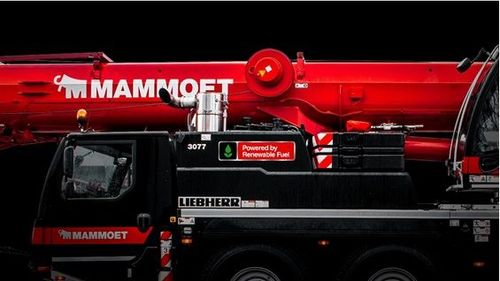Mammoet makes HVO commitment to fuel its carbon reduction goals

SOURCE: Mammoet
April 24, 2025
BY Mammoet
Mammoet on April 23 announced that it will be implementing HVO fuel across the Netherlands, U.K. and Canada from Q2 2025. The move demonstrates that the company is leading the market in developing more sustainable ways of conducting heavy lifting and transport.
This investment in HVO has been driven by higher demand for lower carbon solutions from Mammoet’s customers, and sits within the organization’s wider carbon reduction program.
Hydrotreated Vegetable Oil (HVO) is a diesel replacement fuel made from vegetable oils and animal fats. It can reduce up to 90% of greenhouse gas (GHG or CO2) emissions over its lifecycle when compared to diesel.
Advertisement
By embracing HVO, a significant impact can be made on carbon reduction today. Meanwhile, solutions including grid power, battery operation and – in the case of large projects at remote locations – hydrogen are helping the organization to move closer to zero emissions on site.
Mammoet’s goal is to use HVO100 - which is made from 100% renewable raw materials - as much as possible. Mixable with existing fuel stocks, this alternative fuel is compatible with most diesel engines, and so can begin to be used immediately.
The adoption of HVO has been facilitated by significant change management programs within the affected local organizations; both in process and in infrastructure. For example, Mammoet’s own network of fueling stations that serve its fleet of trucks, mobile cranes and SPMTs.
Advertisement
HVO will be delivered to Mammoet fuel stations in the Netherlands, its U.K. bases in Hixon and Teesside, and branches in Canada. Besides reducing its own impact, this transition will enable Mammoet to create specific offerings for customers where a reduction in emissions is needed.
This innovation joins other recent investments by Mammoet in sustainable operations, including the electric powered SPMT, battery operation for even its largest ring cranes, and various investments in electric equipment.
Pascal Eeken, improvement and innovation manager at Mammoet Europe, said, “This is a significant step we are taking to reduce our carbon footprint. By being the first large heavy lifting and transport company to commit to this new fuel at scale, we will drive down our emissions and showcase that we are also the market leader on this front.”
Related Stories
The U.S. Energy Information Administration maintained its forecast for 2025 and 2026 biodiesel, renewable diesel and sustainable aviation fuel (SAF) production in its latest Short-Term Energy Outlook, released July 8.
XCF Global Inc. on July 10 shared its strategic plan to invest close to $1 billion in developing a network of SAF production facilities, expanding its U.S. footprint, and advancing its international growth strategy.
U.S. fuel ethanol capacity fell slightly in April, while biodiesel and renewable diesel capacity held steady, according to data released by the U.S. EIA on June 30. Feedstock consumption was down when compared to the previous month.
XCF Global Inc. on July 8 provided a production update on its flagship New Rise Reno facility, underscoring that the plant has successfully produced SAF, renewable diesel, and renewable naphtha during its initial ramp-up.
The USDA’s Risk Management Agency is implementing multiple changes to the Camelina pilot insurance program for the 2026 and succeeding crop years. The changes will expand coverage options and provide greater flexibility for producers.
Upcoming Events










